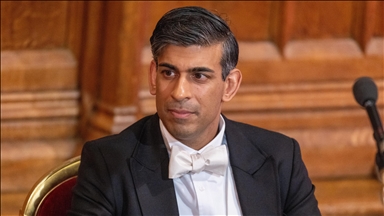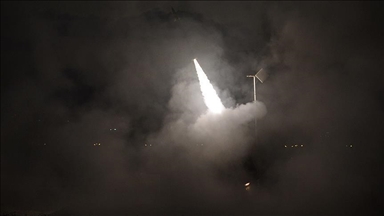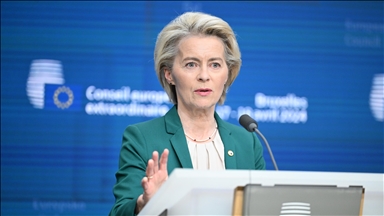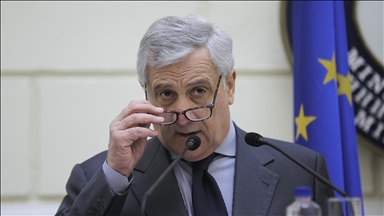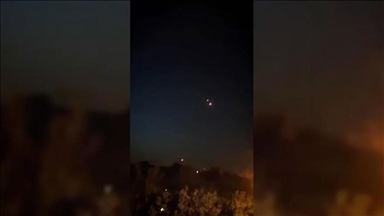Triumph of white turban over black: What next?
With Rouhani helming the executive for 4 more years, the issue of who succeeds Ali Khamenei grows more complicated
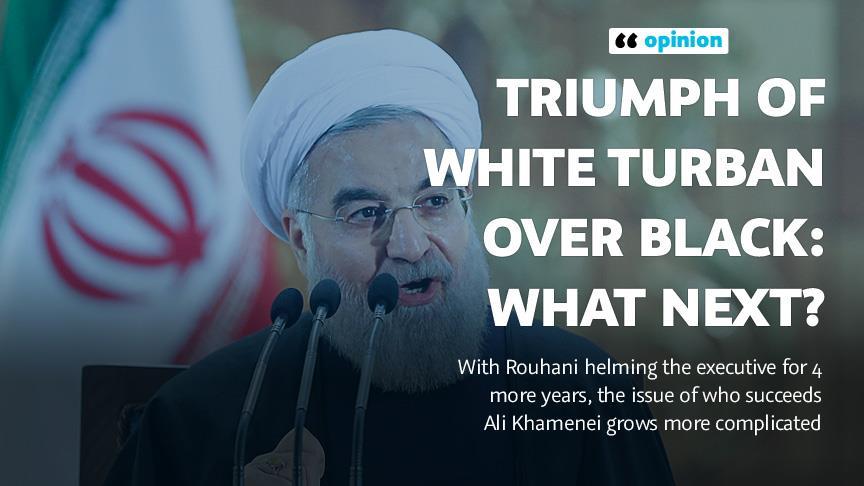
By Selim Celal
The Turkish-based writer is an expert on Iran’s foreign policy and domestic politics.
ISTANBUL
One month after the Iranian presidential elections, held on May 19, the election results are still a hot topic among Iranian political elites.
Even the recent twin attacks on the Iranian Parliament and Ayatollah Khomeini’s mausoleum have not been able to overshadow it.
However, after days of
In Shi’ism, traditionally, a
Besides being a
However, neither his blood relationship with the
In fact,
That is why, in order to attract young voters, he trampled many principles that he had been supporting at the personal and political levels. In this
The principled camp, which
Raeesi’s father-in-law, Hujjatul Islam Alamul Huda, the imam of Friday prayers in Mashhad and the representative of the supreme leader in the city, had single-handedly stood against any musical events in the province.
Now that
Essentially, the principled and moderate-reformist camps are both on the same page with regards to their belief in the undemocratic structure of the Islamic
In the foreign policy domain, the conservatives prefer confrontation while the moderate-reformists believe in compromise. By the same token, the conservative camp believes in an iron fist in the domestic domain while the moderate-reformist camp prefers a velvet fist.
Therefore, no matter which approach prevails in the Islamic
Notwithstanding this, the 12th presidential election brought forth and highlighted several issues that warrant discussion.
Claims of electoral fraud
There have always been
The Iranian ruling elites often attribute these questions to the enemies of Iran and agents of Zionism and imperialism. But the 12th presidential election completely reversed the trend. For the first time in the history of the republic, an establishment-backed candidate put forward claims of electoral fraud.
Only a few hours after the voting started, Ibrahim
Protest against Guardian Council
In addition to the criticisms of the management of the elections, the entire electoral system of the Islamic
Former President Mahmoud Ahmadinejad and his former Vice President Hamid Baqaee, whose qualification for presidential candidacy was rejected by the Guardian Council, went to the polling station together.
Though it is not clear which candidate Ahmadinejad voted for, Hamid Baqaee showed his ballot papers to the reporters. Ironically, instead of writing the name of one particular officially qualified and recognized candidate, he had written Ahmadinejad’s name on the ballot.
Such an action from Baqaee could be interpreted as an open protest against the Guardian Council, its method of vetting the candidates, and the legitimacy of the electoral system in the Islamic
The 12th presidential election also changed the orientation of the principled camp. As its name indicates, the principled camp champions revolutionary ideas and emphasizes the ideals of the Islamic
On the other hand, the reformist camp was born out of the left wing and focuses on egalitarianism. During their campaign, the principled candidates gave the impression of leftists and focused on economic issues.
For instance, the alleged gap between the “4 percent rich” and the “96 percent poor” was highlighted by the principled candidates, not the moderate-reformist ones. It indicates an ideological crisis among the political forces in the Islamic
Rouhani’s last-minute strategy
However, the election results are now confirmed, and Rouhani will retain his seat as president of the Islamic
But he owes his victory not to his performance in the previous term, but rather to his strategy in the last few days before the election.
Seeing the entire state machinery (the executive being an exception) mobilized behind Raeesi, it became a matter of life and death for Rouhani. As a result, he accelerated his criticism of the system, even to the extent of crossing red lines in certain areas.
Although former President Muhammad Khatami’s picture is officially banned in Iran, Rouhani conveyed Khatami’s greetings to his audiences at public gatherings. He also openly talked about ending the house-arrest of the Green Movement leaders.
Above all, he became critical of non-republican institutions, such as the Guardian Council, State Television, the Guardian of the Islamic Revolution Corps, etc., which are all under the direct control of the supreme leader.
Challenges awaiting Rouhani
Rouhani’s election strategy took him to the point of no return. It is difficult to retreat from these slogans. While he would possess at most 20 percent of the power in the Islamic republic, he must deal with several important challenges. These challenges can be categorized into three major themes:
First, Rouhani has created huge expectations. Iranians expect him to stand against the encroachment of non-republican institutions and parallel authorities. These parallel structures are states within the state, and as such, miss no opportunity to undermine Rouhani’s authority and challenge the writ of his government.
For instance, only seven days after the election, the Guardian of the Islamic Revolution unveiled a new underground production site for ballistic missiles, apparently to assert its position as a key determinant
The GIR has particularly found a good opportunity to consolidate its role in foreign policy following the Tehran attacks. It has already fired a number of missiles at Daesh positions in eastern Syria. In the meantime, its spokesman emphasized that the attacks were clear warnings to Daesh’s regional allies, alluding to Saudi Arabia.
Given that the president possesses 20 percent of the power at most, it would not be easy for Rouhani to bring these institutions under control, and Rouhani is aware of this.
That being so, on June 3, he once again asserted that the Iranian nation accepted to have only one supreme leader and one Constitution, hence the government would not tolerate each city – one supreme leader in the country.
A first for Sunnis
Second, a close analysis of the election result suggests that
In fact, the Sunnis have always been determinant in the presidential elections. But this time their role was so evident that no one could ignore it. Because of that, Shaikhul Islam
Interestingly, the core of his speech came to be a clear-cut demand for political secularism. Perhaps it was a first of its kind that the demand for political secularism was echoed by a clergyman in a government building during a political gathering.
Molana Abdul Hamid’s address was well received by the audience. He was appreciated by the slogan “Salute to Molana Abdul Hamid” and clapping. Again, it was for the first time that a Sunni clergyman at the heart of the Shia capital was appreciated by a Shia majority audience on such a large scale.
Sunnis ill at ease
However, the celebration and appreciation period is over.
The establishment will not forgive the Sunnis for supporting Rouhani; it will chase them till the end. To put it another way, the Sunni community is caught in a war of elephants.
he establishment will try to prove to the minorities that they wasted their votes by supporting Rouhani.
Perhaps that is the reason why, only 10 days after the election, on May 30, the Sunnis’ prayer hall in Tehran was occupied, vandalized, and sealed. The
Open rift between Khamenei, Rouhani
Finally, the real challenge of Rouhani is related to the issue of succession of the supreme leader. There is no doubt that
Had
With Rouhani in the front seat of the executive for another four years, the issue of succession has become more complicated. It is perhaps for this reason that the supreme leader begrudged Rouhani a plain “congratulations” while he applauded Ibrahim
Scenarios for new supreme leader
If the 78-year-old supreme leader dies without nominating a successor, a three-member supreme leadership council would lead the country until the appointment of the new supreme leader in line with Article 111 of the Iranian Constitution.
As president of the Islamic
If that really proves to be the case, four scenarios that we can grade from the ideal to the worst can be predicted for Rouhani.
First, like Khamenei in 1989, Rouhani himself becomes the next supreme leader.
Second, like Ali Akbar Hashemi, Rouhani brings someone “from up his sleeve” and pushes him as the next supreme leader.
The third option would be to emerge as the Mikhail Gorbachev of the Islamic
Fourth, the guardian of the Islamic Revolution would intervene to appoint its own supreme leader and then force Rouhani to step down, like what happened to Abul Hassan Bani Sadr in 1981.
The realization of any of these scenarios would be the result of a sophisticated interplay of various factors.
* Opinions expressed in this article are the author’s own and do not necessarily reflect the editorial policy of Anadolu Agency.
Anadolu Agency website contains only a portion of the news stories offered to subscribers in the AA News Broadcasting System (HAS), and in summarized form. Please contact us for subscription options.



